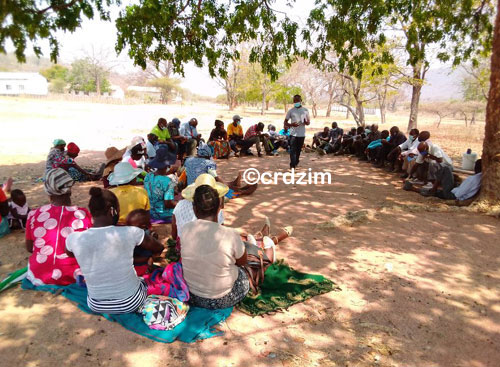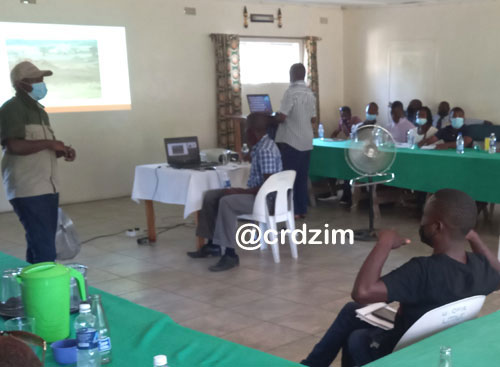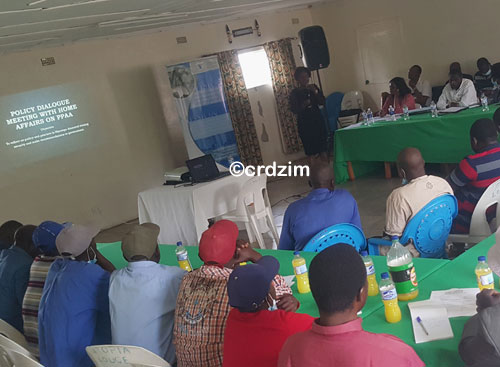The Fast Track Land Reform Programme (FTLRP) was adopted by government as critical to address colonial legacies by redistributing land lost to traditional communities. The colonial administration removed traditional communities from high productive crop regions to low rainfall regions. The dispossession of their ancestral land was masterminded by an unjust communal land tenure system that took away their right to own land and natural resources. The communal land tenure system together with the Mines and Minerals Act invested title over land and minerals to the President. Over 60% of the population living on communal land only have usufruct “right to use” over land which it can be taken away at any time even though generations or lineages would have occupied that land for hundreds of years.
The emergence of a labour backed political movement in the late 1990s in Zimbabwe drove the ruling party to fast track land reform as a political tool to buy political support from traditional rural communities. As such Fast Track Land Reform Program (FTLRP) was dominated by looting, unequal distribution and political patronage. FTLRP did not deconstruct the unjust colonial land system but rather maintained it for furtherance of political control over land and natural resources by the former liberation movement governing Zimbabwe. The majority of people that moved into former commercial farms distributed under FTLRP A1 and A2 farms have no security of tenure over the land they occupy. Permits issued by government to these farmers derive their legality from the existing colonial land tenure system which the government has conveniently maintained. These permits can be revoked at the Minister’s “sole discretion on payment to the land holder of such compensation as the Minister may determine.”
Citizens living on communal land and land acquired under FTLRP cannot freely exercise their civil liberties enshrined in the Constitution of Zimbabwe 2013 and their right to derive social economic justice from resources found in their territories is limited. Therefore, the FTLRP did not restore ownership rights of land and natural resources to traditional communities which they lost as a result of colonial injustices. Traditional communities have continued to live in abject poverty because of limited land rights.
Meanwhile accelerated mining developments have aggravated the vulnerability of traditional communities to loss of land, forced displacements, loss of livelihoods, political manipulation, loss of culture and dignity. The Constitution embraces international best practices on people’s civil and political rights; environmental, socio-economic and cultural rights. Against this background, we at CRD are undertaking several campaigns to support traditional communities to claim these rights in natural resource governance.
Land and Community Rights Campaigns
Free Prior and Informed Consent (FPIC)
CRD is advocating for the main streaming of United Nations Declaration on the Rights of Indigenous Peoples establishes a universal framework of minimum standards for the survival, dignity and well-being of indigenous peoples. Free, Prior and Informed Consent (FPIC) is a right granted to indigenous peoples to give or withhold their consent for any action that would affect their lands or rights. Zimbabwe also ratified the Africa Union Kampala Convention for the Protection and Assistance of Internally Displaced Persons on internal displacements which restates the principles of international human rights, humanitarian laws. CRD calls for the domestication of these international best practices in local government and mining reforms. CRD is also exploiting democratic provisions in the Constitution on the rights of citizens to inform best practices that protect people from vulnerabilities created by development induced displacements. CRD is engaged in FPIC policy advocacy by promoting community exchange visits for knowledge sharing, education and awareness raising, community mobilization and stakeholder dialogues and accompanying victims of mining displacement to explore legal remedies where necessary.
Therefore, where relocation is unavoidable CRD is advocating for:
Community consultation and approval through FPIC
Inclusive, independent, and consultative assessments
Relocation with prompt, fair and adequate compensation
Protection of mining communities (both people and the environment) from abusive practices of the mining companies.
Relocation destination preparedness. Displacement plans must be fully implemented and in a proper manner. Mining companies must bear the costs of displacement and must not transfer costs onto the displaced people. The place of relocation must have adequate facilities and services for the people.
Reforming the Communal Land Act
CRD is advocating for amendments to the Communal Lands Act (Chapter 20:04) of 2004 to empower traditional leaders over their rights to administration of communal land enshrined in the Constitution. Amending the Communal Lands Act must guarantee security of tenure for citizens living on communal land and their right to FPIC and compensation when the State decides that it is in the public interest to set aside communal land for any purpose within the confines of the Communal Land Act.
Reforming Protected Places and Areas Act
“Human security means to protect the vital core of all human lives in ways that enhance human freedoms and human fulfillment. It means creating political, social, environmental, economic, military and cultural systems that together give people the building blocks of survival, livelihood and dignity”(CHS:2003:4)
CRD is internationally credited for bringing to world evidence of state sponsored violence on citizens in Marange diamond rush that started in 2006. In its previous advocacy work in the Kimberly Process, CRD spelt out that the term conflict diamonds must be redefined to hold the state accountable for perpetrating human rights abuse in Marange diamonds. The declaration of Marange diamond fields a protected area by government in April 2007 marked the perpetuation of human rights abuse on the traditional community of Marange by the state security establishment.
CRD is leading a campaign in Marange that is calling for the review of General Notice 180 of 2007 placing Chiadzwa under Protected Places and Areas Act .CRD share the position that the conditions and compliance to PPAA is leading to violation of human rights and an unreasonable limitation of Constitutional rights. Section 86 (3) provides that, “No law may limit the following rights enshrined in the bill of rights, and no person may violate them (a) the right to life (b) the right to dignity, (c) the right not to be tortured or subjected to cruel, inhuman or degrading treatment or punishment..
These rights are being violated daily in Marange by state security agents. CRD is seeking to influence PPAA reforms through research and documentation of rights abuses, community security stakeholder meetings, policy dialogues. CRD firmly believes that the review of PPAA on Marange is important for the community of Marange to attain basic freedoms and access to economic development. Reforming the PPAA on Marange is progressive towards safeguarding the rights of traditional communities likely to be affected by PPAA when strategic minerals like diamonds are discovered.
Protection of mining communities from abusive practices of the mining companies
Relocation destination preparedness. Displacement plans must be fully implemented and in a proper manner. Mining companies must bear the costs of displacement and must not transfer costs onto the displaced people. The place of relocation must have adequate facilities and services for the people.



